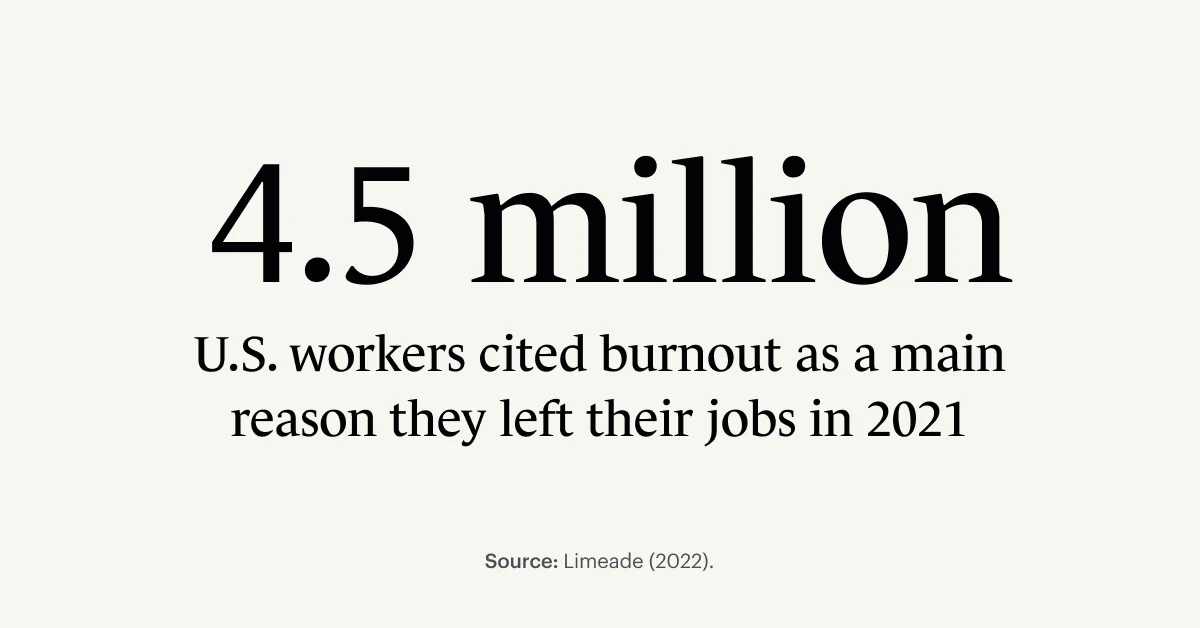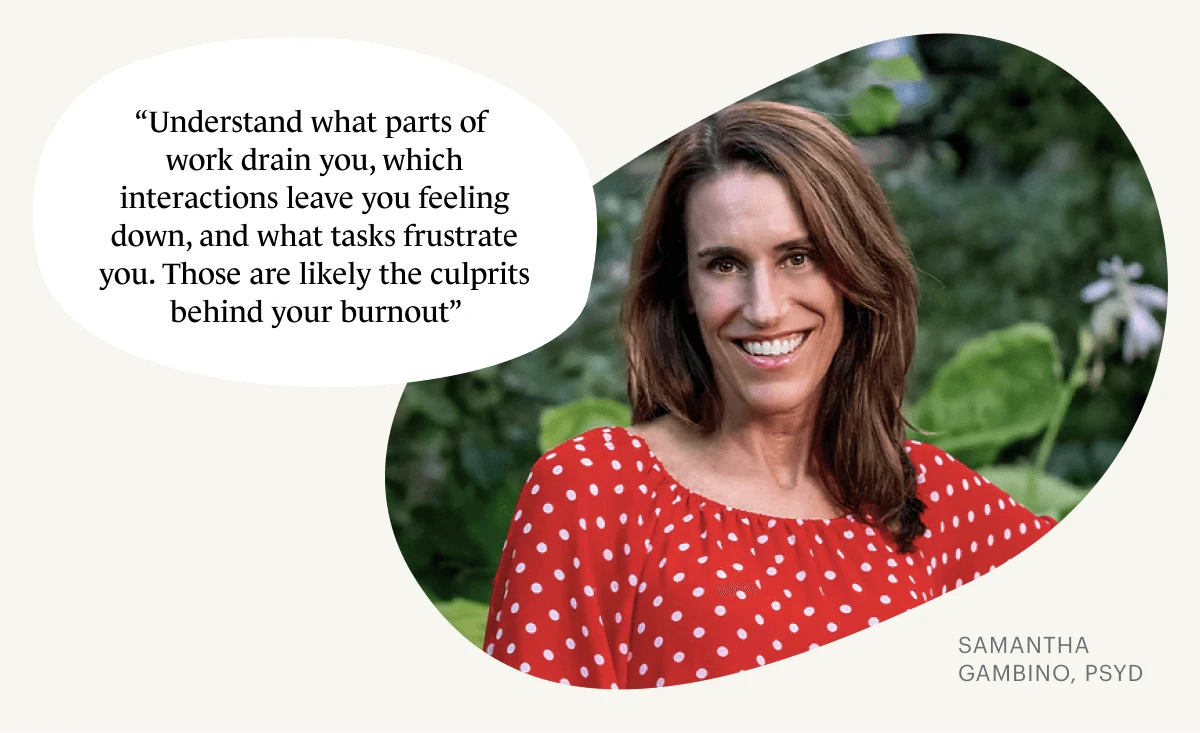Lately more and more Americans are burning out. And it’s a serious situation.
Burnout can have a detrimental impact on your work and your life. But what exactly is it? And how can you tell if you’re burning out?
You may also be wondering what you can do to fix it and recover.
Read on for expert advice on that too.
Burnout fueled The Great Resignation
According to a study conducted by Limeade, burnout was cited as the main reason 4.5 million U.S. employees left their jobs during The Great Resignation in 2021.
The tendency toward overwork is practically ingrained in today’s culture.

Long hours, 24/7 connectivity, and doing whatever it takes to get the job done are rewarded. Jobs are becoming more demanding, more time-consuming, and more stressful.
And that’s driving more people to burn out.
In a March 2021 Indeed survey of 1,500 U.S. workers, more than half (52%) said they’re feeling burned out.
What does burnout even mean?
First things first—what’s actually going on when someone burns out?
“Burnout is a type of long-term job stress characterized by three main features,” says NYC-based clinical psychologist Dr. Samantha Gambino, Psy.D.
Gambino specializes in anxiety, burnout, stress management, and wellness.
“The first is overwhelming emotional and physical exhaustion,” she explains.
“The person experiencing burnout feels incompetent, inefficient, ineffective, and loses confidence in themselves.”
In addition to physical and emotional fatigue, people burning out also experience detachment and feelings of cynicism about their jobs—along with a decreased sense of accomplishment.
“The person experiencing burnout feels incompetent, inefficient, ineffective, and loses confidence in themselves,” says Gambino.
Burnout may contribute to or exacerbate existing mental health issues.
One important characteristic of burnout is that, by definition, it’s work-specific.
“While stress, depression, and burnout can include physical and mental exhaustion, burnout also involves feeling detached from yourself, your work, and others,” says Gambino.
“It’s job-specific and involves feeling ineffective and less competent at work,” she explains.
Is burnout considered a mental illness?
According to the World Health Organization, burnout is an “occupation phenomenon"—not a mental illness.
That said, burnout may contribute to or exacerbate existing mental health issues.
For example, someone who already suffers from an anxiety disorder may find burnout causes their anxiety to worsen.
Similarly, someone who struggles with depression may find their symptoms harder to manage during periods of burnout.

The signs of burnout
While not a mental illness, clearly burnout’s detrimental to our wellbeing. And many workers don’t realize they’re burning out until it’s too late.
It’s essential to know the symptoms so you can take action before you become fully burned out and debilitated.
According to job and career burnout specialist Dr. Erica Buchholz, Ph.D., common signs of burnout include:
Mental and/or physical exhaustion
Feelings of failure or self-doubt
Feeling helpless or “trapped” at work
A noticeable decline in motivation
Feeling a lack of control
Lowered sense of satisfaction.
Avoiding tasks you used to enjoy
Physical symptoms of pain that are unexplained by other conditions (like headaches or stomach issues)
Keep in mind, while these are some of the most frequently seen symptoms of burnout, it can manifest in distinctive ways for different people.
And the severity can vary widely from person to person.
“Burnout exists on a spectrum, meaning some people have fewer feelings or symptoms–while others show all of the symptoms of burnout,” says Buchholz.
“Some people can continue to function in their work and life, even while experiencing burnout—whereas others experience debilitating symptoms, like pain and physical illness or impairment,” she explains.

The 5 stages of burning out
Burnout doesn’t appear suddenly all at once. It generally occurs over a long stretch of time—and it happens in five stages or phases:
The honeymoon phase. The honeymoon phase happens when you just start a new job or project. Everything is exciting, there’s minimal stress, and you feel energized and engaged at work.
Onset of stress. The honeymoon can’t last forever! During this next phase, significant stressors start to crop up at work. It can become more challenging for you to focus or feel excited about the job you’re doing. You may also notice yourself starting to feel stress about work outside of office hours.
Chronic stress. During this stage, you’re stressed at work every day. Negative feelings around work—for example, resentment or apathy—become more common. You feel overwhelmed, physically and emotionally exhausted, and it becomes increasingly harder to get things done, which may lead to procrastination, missing deadlines, and/or absenteeism.
Burnout. This is the stage where you hit your limit and burnout officially kicks in. You feel completely disengaged from work. You’re experiencing profound physical and mental exhaustion—and no amount of sleep or rest seems to help, yet you feel like you’re not accomplishing anything.
Habitual burnout. Habitual burnout is the last stage of burnout—and, as the name suggests, it happens when the experience of burning out becomes chronic and habitual. Instead of the occasional, short-lived burst of burnout, in this stage, burnout becomes your day-to-day experience—and the chronic stress has a serious impact on both your work and your health.
There’s no universal timeline or path people move through burnout’s five stages.
For instance, some workers may go from the honeymoon phase to habitual burnout in a matter of months—while others may languish in chronic stress for years before crossing the threshold to fully burning out.
How to fix, cure, recover from burnout
If you’re burning out, these steps can help you bounce back:
Identify what’s driving you to burn out—and address it
You can’t fix, cure, or get better from burnout until you know what’s causing it. Consequently, the first step toward recovery is to identify what’s behind your burnout.
“Understand what parts of work drain you, which interactions leave you feeling down, and what tasks frustrate you,” says Gambino. Those are likely the culprits behind your burnout—and once you know what they are, you can take steps to address them.
For example, if you realize you feel overwhelming frustration every time you interact with a certain co-worker, you might look for ways to minimize, or even eliminate, your interactions with that person.

If you’re feeling disengaged or drained by the type of work you’re doing, you might ask your manager about switching up your work responsibilities—and taking on tasks and projects that feel more exciting.
Not only will taking active steps toward identifying and dealing with your triggers help you to feel more empowered, the action itself might help to shake the experience of burnout.
“A lack of control can contribute to burnout,” says Gambino. “So feeling in control can help shift your perspective.”
Rest and recharge to recover from burnout
“Burnout occurs when you keep burning more emotional and physical resources than you have,” says Dr. Tasha Holland-Kornegay, licensed mental health clinician and founder of Wellness in Real Life (WIRL), a platform designed to help healthcare workers prevent and overcome burnout.
So, in order to recover from burnout, you need to give yourself the time and space to rest and recharge.
Make rest a priority.
Practice a sleep hygiene routine, and catch up on your sleep.
Use your free time to enjoy restorative, pleasurable self-care activities, such as watching a great movie, playing a fun video game, or reading an engrossing book.

Once you’ve had some time to rest, shift into recharge mode.
According to Holland-Kornegay, self-care activities teach you more about yourself, finding self-compassion, and bringing deep calm to your days.
These activities, such as yoga, exercise, mindfulness, and meditation, can help you replenish your mental and physical resources—and help you get ready to re-engage with work.
Let people know you're burnt out and ask for help
If you’re experiencing burnout and want to recover, reach out to your support network—whether that’s family members, friends, or a therapist or mental health professional near you—and ask for help.

You may feel alone when you’re dealing with burnout, but you don’t have to be!
“Often, when someone first realizes they are actually experiencing burnout, there are deep feelings of sadness," Buchholz explains.
"Some people begin to blame themselves for experiencing burnout, which leads to them feeling even worse,” says Buchholz. “Supportive family, supportive friends, and supportive professionals can help people begin to put together a plan for recovery.”
Reach out to a counselor or therapist who can help with burnout
Asking for help before you reach the point of no return—for example, during the chronic stress stage—can help get you the support you need to prevent full-blown burnout.
Check out the Monarch Directory by SimplePractice, to find licensed therapists near you and choose to browse therapists and counselors who accept your insurance.

Each therapy provider’s page on Monarch lists their hourly fees directly underneath their areas of specialty. Many therapists on Monarch also allow you to book free 15-minute initial consultation sessions.
Speaking with a therapist may help.
How to prevent burnout
The good news? The strategies you use to fix, cure, and recover from burnout are the same strategies you can also use to prevent it from ever happening again.
For example, prioritizing time to rest and recharge will help you better manage stress and keep burnout at bay.
Honing awareness of the specific work-related aggravations that may ultimately push you toward burnout can help you avoid and/or address those issues.
Setting better boundaries around your work can also help to prevent burnout.
“Be clear about your work hours,” says Gambino. “And give yourself breaks during the day where you step away from work.”
In an ideal world, we might never have to deal with burnout. Or, perhaps it’s a constant part of the human condition.
If you’re feeling like you’re burning out you’re now armed with strategies to identify it, address it, and ultimately, bounce back!
READ NEXT: 5 Signs of High-Functioning Anxiety
Need to find a therapist near you? Check out the Monarch Directory by SimplePractice to find licensed mental health therapists with availability and online booking.










